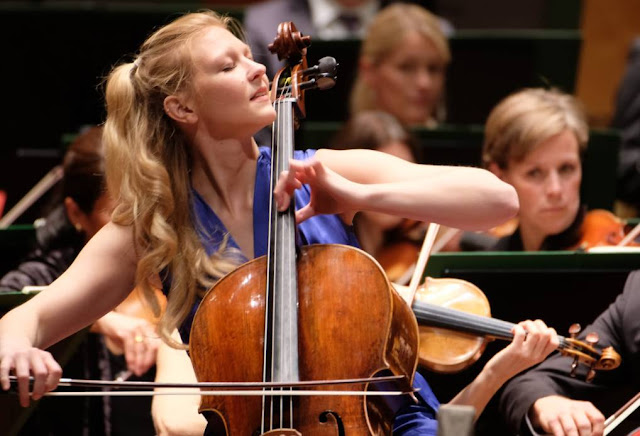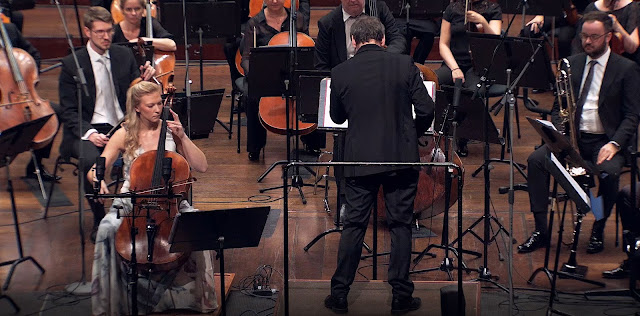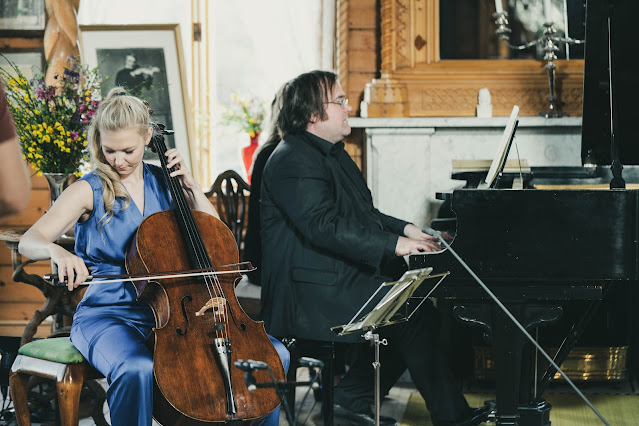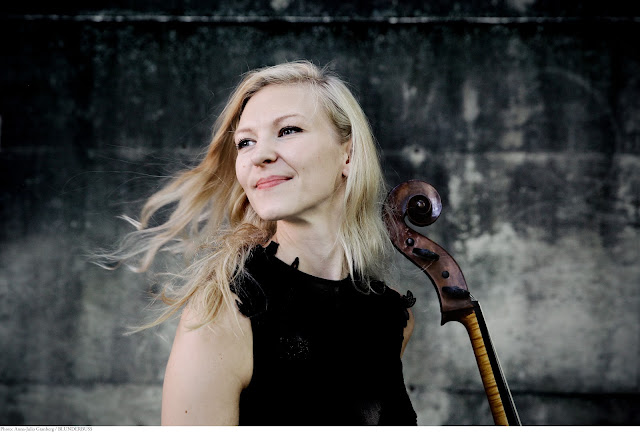 |
| Amalie Stalheim (Photo Arne Hyckenberg) |
In December 2021, the Norwegian cellist Amalie Stalheim released her debut album with the Oslo Philharmonic and Ingar Bergby on LAWO Classics, an EP featuring Norwegian composer Lasse Thoresen’s Journey Through Three Valleys: Symphonic Concerto for Violoncello and Orchestra, an extremely technical and virtuosic, three-movement symphonic concerto that was premiered in 2008. Also last Autumn, Amalie was announced as the winner of the Norwegian Soloist Prize 2021, the prize for which includes a performance at the 2022 Bergen International Festival and a soloist assignment with the Bergen Philharmonic Orchestra that will also be broadcast by national broadcaster NRK. I recently spoke to Amalie to chat about Lasse Thoresen's concerto as well as her support for other contemporary cello works.
The idea for recording Thoresen's concerto came from the Oslo Philharmonic. The orchestra had given the work's premiere in 2008 (with soloist Truls Mørk and conductor Jukka Pekke Saraste) and planned to do a portrait disc of Lasse Thoresen, combining the concerto with a large orchestral piece. Unfortunately, the recording of this latter has had to be postponed, but luckily for Amalie the concerto was fitted in between two lockdowns and the recording has been released as an EP digitally.
Amalie's father is the Norwegian accordionist and composer Jostein Stalheim, and he was a pupil of Thoresen's so the first time that Amalie heard Lasse Thoresen's Symphonic Concerto was at the composer's house, along with her father. She admits that that first time, she got lost following the score almost immediately and simply let herself be carried away by the work's large-scale symphonic landscape. She finds it a stunning work that really speaks to her. The piece incorporates a highly technical solo part along with music influenced by Norwegian folk music, and each element has a purpose in the creation of the landscape. Amalie had never heard a cello concerto before that was so symphonic, the soloist almost trying to push through the orchestra.
 |
| Lasse Thoresen: Journey Through Three Valleys: Symphonic concerto for violoncello and orchestra - Oslo Philharmonic, Ingar Bergby - Oslo Konserthus 2021 |
She has always played a lot of new music, and it has been part of her repertoire, quite natural for her to include new pieces in concerts and competitions. Partly, she attributes this to growing up around new music with her father who, if he was writing for the cello, would have discussions with her and get her to try things out. In 2018 she won the Swedish Soloist Prize, and the prize included a new commission for a concerto and hers was commissioned from Anders Nilsson. It was a huge success (including winning Art Music of the Year/large ensemble at the Swedish Music Publishers' Prize, and they made a recording.
This was the starting point and she felt that she would like to do more for contemporary cello repertoire, inspired by the example of the cellist Mstislav Rostropovich who was responsible for works by Shostakovich and Prokofiev. She considers not just Rostropovich's impact on contemporary cello repertory, but his exploring of new ways of playing. Amalie also cites performers such as violinist Anne-Sophie Mutter and soprano Barbara Hannigan for their involvement in contemporary repertory. After all, it is not that long ago that the cello became a significant solo instrument, and she feels that it is nice to be part of the process of expanding the repertoire as well as having a responsibility to be in contact with contemporary composers.
Amalie is currently working with several contemporary composers on projects. Initially, she talked to Scandinavian composers whom she knew but is widening her reach to work with composers she has worked with before. At the Bergen International Festival, she will be taking part in the premiere of Missy Mazzoli's Year of Burning for cello and choir, a co-commission by the festival and a work Amelie finds very exciting have heard Missy Mazzoli's Violin Concerto recently. Amalie is finding the combination of choir and cello interesting, and she cites the cliché about the cello resembling the human voice but adds that for her the cello is her voice.
Amalie's father has dedicated several pieces to her, and she frequently plays his solo cello piece and each time she plays it she discovers new things. But also, when she is looking at new works by other composers she finds it amazing to be able to have a dialogue about the music with someone she knows well.
She probably spends around half of her time performing contemporary music, and this has been a conscious decision. But she needs the traditional Romantic repertoire too, both styles give her something different. Playing the Elgar and the Dvorak concertos contributes to her sound quality and technique, things that she devoted hours to when studying. Playing these works helps her get back to her sound. But playing contemporary music gives her new perspectives on the older pieces, as well as being able to talk to the composers. And playing a new piece gives her a sense of freedom, the ability to experiment and find things for herself rather than simply relying on tradition.
 |
| Amalie Stalheim & Christian Ihle Hadland (Photo Thor Brødreskift / Bergen International Festival) |
Another important strand in her repertoire is chamber music, and she has just finished recording her first recital disc with pianist Christian Ihle Hadland, a programme of Debussy, Poulenc and Stravinsky's Suite Italienne, describing the recording process as super-intense and tiring, but very inspiring. She played in a string quartet from the age of ten, including playing in a permanent quartet for several years and whilst studying they would concentrate on one composer for three months, diving into the chamber music. Amalie and Christian will be performing a programme of Poulenc, Stravinsky, Grieg and Norwegian composer Harald Sæverud (1897-1992) at the Bergen International Festival in May.
But it isn't just chamber music per se, it is the personal interaction with a small group of performers that is important to her. Life as a travelling musician can be tough, and it is helpful to be able to get to know musicians, have discussions with them and listen to them, and for her, the best soloist gigs are the ones which are like chamber music with strong communication with the players.
Three years ago she did a project with the Swedish jazz trio LSD, where the trio joined forces with a quartet of string players; there was no piano involved so the strings were the harmonic instrument. It was intended to be a one-off event but was such a success that they have continued and she has just finished a tour of North Sweden performing music by Lars Gullin (1928-1976), a Swedish jazz saxophonist. The group also performed music by Georg Riedel who wrote the music for Astrid Lundgren's Pippi Longstocking, and Amalie was very star-struck when she met him.
Not only does Amalie's father play the accordion but her mother did too. Amalie's elder sister started learning the violin, and when she was four or five Amalie started on the piano. Whilst she would play with her elder sister, she felt envious that her sister could go off and play with other people whilst she had to spend a lot of time alone at the piano. She loved the idea of performing as part of a team, chamber music and sharing with others. As a result, she started playing the cello (her sister had vetoed the idea of her learning the violin), going on to play in youth orchestras and a string quartet, but combining this with piano and football. But after breaking her wrist she had to stop sports and really had to choose, especially as her parents had to ferry her between rehearsals and football. Eventually, she realised that whilst playing the piano was relaxing and therapeutic, she practised the cello more and concentrated on that.
 |
| Amalie Stalheim (Photo Anna-Julia Granberg / BLUNDERBUSS)jpg |
Coming up she has the Norwegian premiere of Swedish composer Britta Byström's cello concerto, and she will be playing chamber music with friends in Oslo including Jörg Widman's Hunting Quartet (Quartet No. 3). They live-streamed the work in 2020 and she describes it as a terrific piece, and she gets to scream her heart out in the cello part! But there is a Romantic repertoire too as she is playing the Elgar concerto in Finland.
Full details of Amalie Stalheim's forthcoming concerts from her website.
Lasse Thoresen: Symphonic Concerto for Violoncello and Orchestra 'Journey through the valleys' Op.38 - Amalie Stalheim, Oslo Philharmonic Orchestra, Ingar Bergby - LAWO Classics, available on Spotify
Never miss out on future posts by following us
The blog is free, but I'd be delighted if you were to show your appreciation by buying me a coffee.
Elsewhere on this blog
- A room of mirrors: Emiliano Gonzalez Toro, Zachary Wilder and Ensemble I Gemelli - record review
- Bleckell Murry Neet: Traditional tunes from Cumbria in engaging modern versions for guitar and harp - record review
- Black Renaissance Woman: Samantha Ege and John Paul Ekins explore music by six remarkable women from the Chicago Renaissance - record review
- Fun, seduction & politics: Rimsky Korsakov's The Golden Cockerel from English Touring Opera - opera review
- A new opera, an unperformed 19th century opera, plus Weber & Bellini: I chat to Richard Tegid Jones of Rugby-based Random Opera Company - interview
- A joyful celebration of playing together: MiSST's 9th Annual Concert - article
- Urban dystopia: Guildhall School's double bill of Judith Weir's Miss Fortune and Menotti's The Telephone - opera review
- Elan and style: Grands Motets by Michel-Richard De Lalande from Sébastien Daucé and Ensemble Correspondances - record review
- Iceland: The Eternal Music - Graham Ross and the choir of Clare College explore the contemporary music of Iceland - record review
- A superbly engrossing performance: James Newby and Simon Lepper in Schubert's Die schöne Müllerin at Wigmore Hall - concert review
- English Touring Opera's revival of Puccini's La Boheme proves finely satisfying - opera review
- The Last Castrato: Max Hoehn and Torsten Rasch on their new collaboration as part of Opera21's platform for new opera - interview
- Home











No comments:
Post a Comment